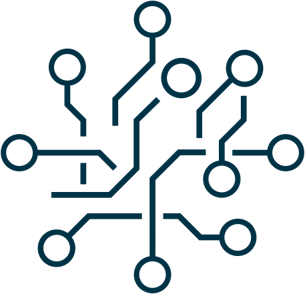AI is a disruptive force. People worldwide are playing around with common tools such as ChatGPT to boost their creativity and output. And AI increasingly joins the workforce: According to IBM’s Global AI Adoption Index 2022, 35% of businesses across industries use AI, 75% of top executives believe AI will help their organization grow – numbers that most likely have soared in the meantime.
Naturally, AI is also widely used in software development, the industry from which it originates.
This blog post unveils how AI reshapes the software engineering landscape, how it impacts programming jobs, and how they’re expected to evolve. Of course, we shed some light on the pros and cons of AI in software engineering and – most important – answer the predominant question: Will AI replace software engineers?

How do software engineers use AI in 2024?
Have you ever wondered whether in the era of AI software engineers are simply twiddling their thumbs and let the technology do the work? It’s not that simple.
The current role of AI in software engineering
Understanding that AI is shaping the world of software development is key. Tools infused with AI capabilities are becoming commonplace for engineers. They assist in various facets of the development process, such as automating redundant tasks, creating and optimizing code, detecting errors, and improving the user experience.

A prominent example is DeepCode, an AI-powered tool that analyzes source code, finding potential bugs, vulnerabilities, and providing suggestions on code quality. GitHub Copilot, another tool, focuses on generating code based on context and existing code examples. Trained on billions of lines of code, it can act as a pair programmer for developers, automatically generating code, providing and implementing suggestions.
A few more tools, can be found here.
The impact of AI on programming jobs: a deep dive
From the dawn of programming, there's been an ever-present need for evolution and adaptation. The impact of AI on programming jobs is undisputed. With AI advancements, times are transforming, and so must the programmers.
How AI is changing the job landscape for programmers
By automating repetitive tasks, enhancing productivity, enabling advanced debugging, etc., AI is pushing programmers to adapt to new roles. What does this mean in real life? Let’s hear it from Jessica:
«As an experienced software engineer, I until recently generated code from scratch, optimized, tested, and corrected it. To gather information, I relied on my knowledge of frameworks and libraries, searched the Internet, or asked around.
Today, all these tasks, and more, are carried out by generative AI tools – in a fraction of the time. This impacts my daily routine as a programmer.
When I now need to implement new functionality in my project, I start with ideation. Broadly describing the technological and business constraints and the vision for the new features, I instruct the AI to come up with two distinct proposals to approach the problem. I select one of the proposals and suggest refinements using my domain knowledge.
After this I instruct the AI assistant integrated into the IDE (integrated development environment) to generate code stubs, basic structures, and initial implementation for the business logic - speeding up the initial development phase. I then step in to refine this AI-generated code, ensuring it aligns perfectly with the project's specific needs and guidelines.
The final step involves my thorough review, since I still own the overall responsibility for his contribution.»
Skills programmers need to stay relevant in the age of AI
As AI is here to stay, AI-related but also certain traditional skills are becoming increasingly valuable, for example:
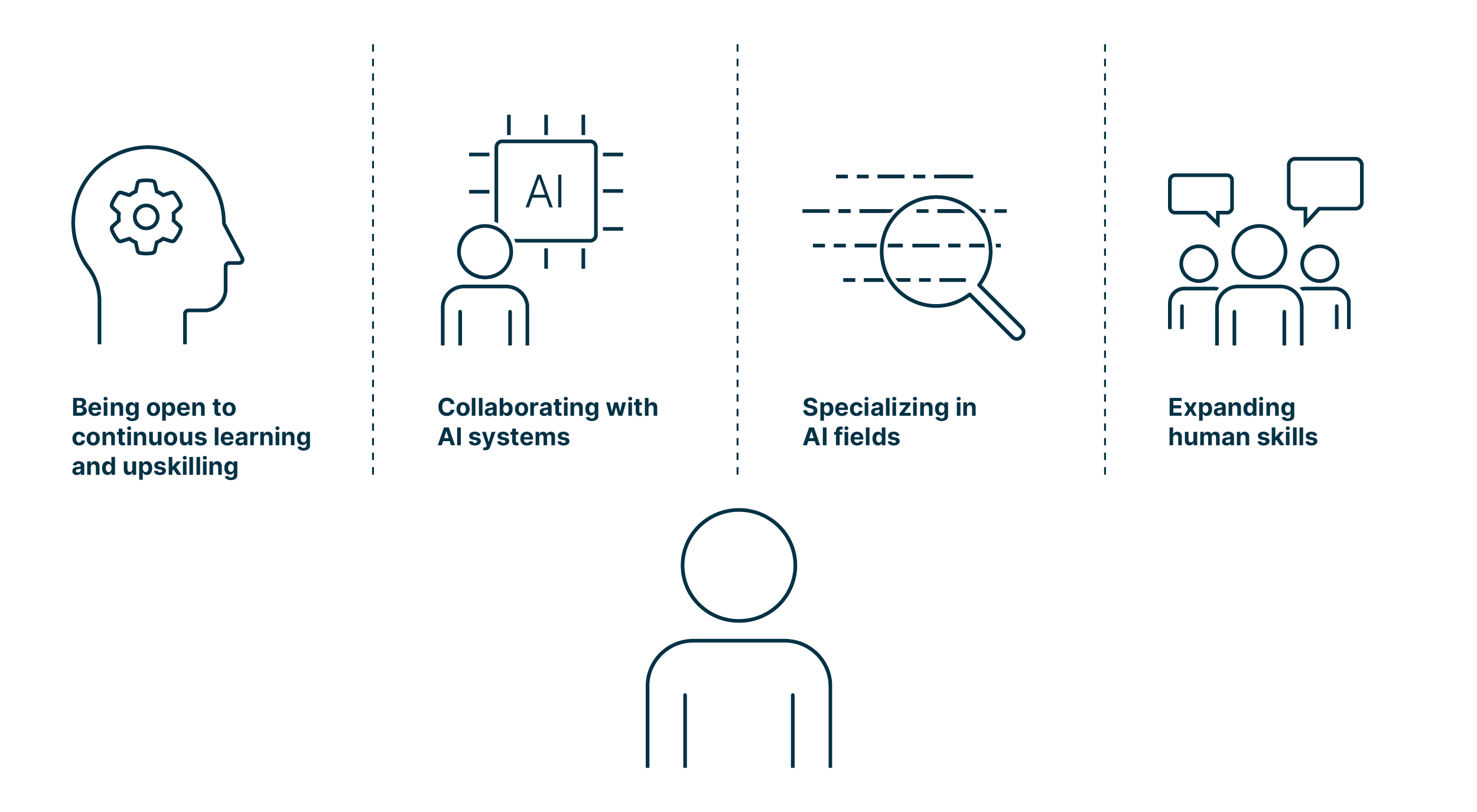
- Being open to continuous learning and upskilling
Programmers like Jessica need to stay updated on the latest AI technologies, tools, and programming languages, to acquire new skills, and participate in AI-focused communities. Just as important: Understanding what business needs arise from the disruption and learning how to adapt to major trends – to ultimately be able to utilize their AI knowledge to solve real problems of people out there. - Collaborating with AI systems
Programmers should understand how to integrate AI tools into new designs and into the development process to enhance efficiency and productivity. An increasing number of developers will need to pick up data engineering, ML frameworks, etc. to learn how to use them as part of their work. - Specializing in AI fields
To be on the super-safe side, programmers may identify specific areas within AI, such as natural language processing, computer vision, or reinforcement learning, and specialize in them. - Expanding human skills
As AI takes over routine tasks, programmers can focus on complex challenges that require critical thinking, creativity, or intuitive problem-solving – human capabilities AI tools are unable to replicate. This also includes soft skills such as communication, teamwork, and adaptability that are essential for collaborating with interdisciplinary teams.
|
«Programmers need to understand what business needs arise from the disruption and learn how to adapt to trends – to utilize their AI knowledge to solve real problems of people out there.» Dávid Balakirev |
|
AI automation in coding: a blessing or a curse?
Whether AI automation in coding is a blessing or a curse can vary depending on the context and the goals (e.g., off-the-shelf vs. customized software) of a company.
The benefits of AI automation in coding
| Best practices for implementing AI governance |
|
|
Enhanced productivity |
|
|
Higher code quality |
|
|
Scalability and adaptability |
|
|
Code personalization |
|
|
Consistency across projects |
|
|
Learning and skill development |
|
No doubt: AI automation provides multiple benefits throughout the development life cycle and across the organization. These are the main performance boosters:
- Enhanced productivity
Automation reduces the time developers spend on mundane tasks, which allows them to focus on more complex and creative aspects of their work, resulting in higher-value contributions. - Higher code quality
AI analyzes code patterns, detects potential bugs, and suggests improvements, contributing to overall code quality. Automated reviews help identify issues related to coding standards, best practices, and potential vulnerabilities. - Scalability and adaptability
As AI automation is scalable, it makes it suitable for projects of varying sizes and complexities. Plus, the adaptability of AI tools to different programming languages and frameworks enhances their utility across development scenarios. - Code personalization
AI tools can adapt to individual coding styles and preferences, providing personalized suggestions and enhancements. Developers can thus customize the AI tool to align with their coding habits, improving the user experience. - Consistency across projects
By enforcing coding standards and best practices, AI automation ensures consistency in coding practices across projects, leading to easier maintenance and collaboration among development teams. - Learning and skill development
AI assists developers in learning new programming languages, libraries, frameworks, and concepts. Additionally, continuous feedback and suggestions from AI tools contribute to ongoing skill development.
Examples of tasks that can be automated by AI
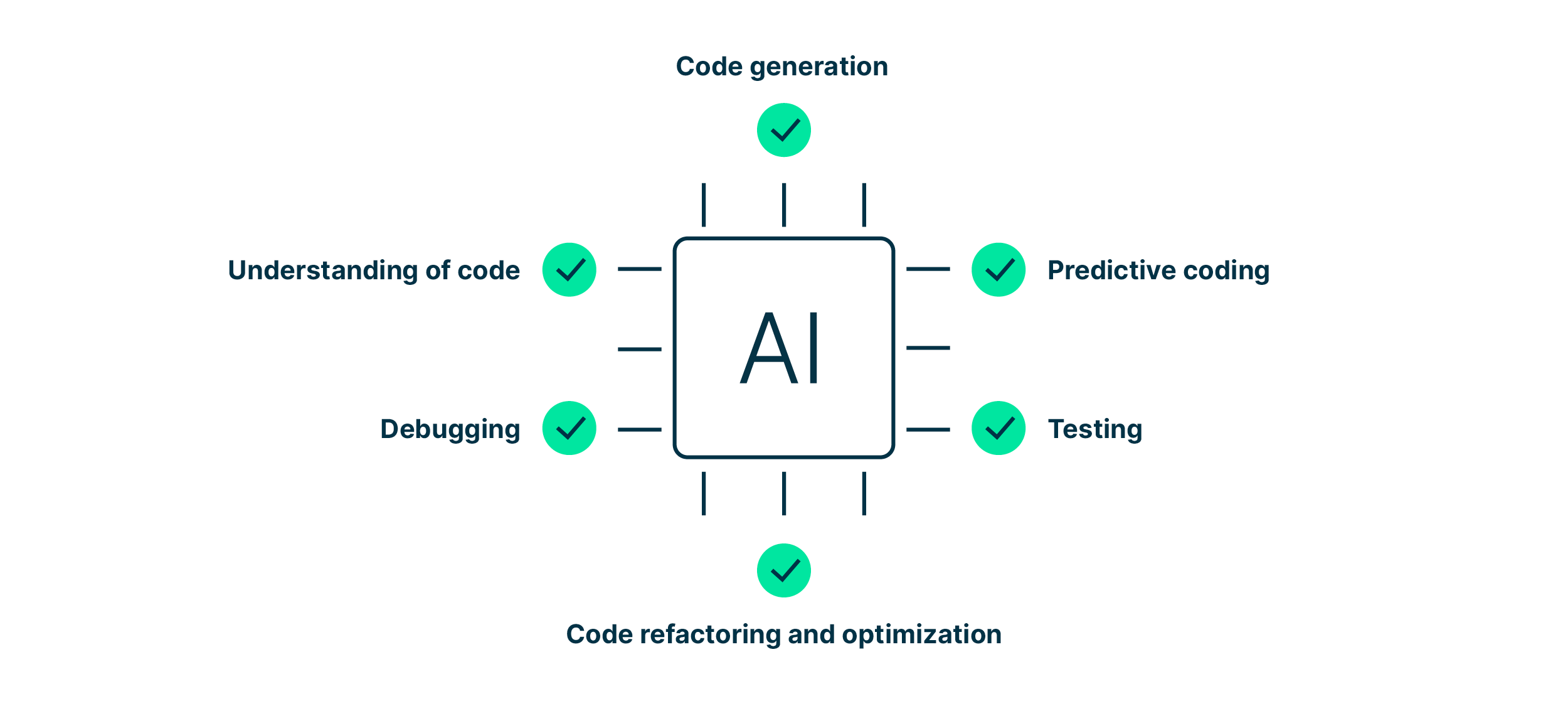
Tasks that can be automated by AI:
Code generation
- Create snippets, templates, or even entire functions
Understanding of code
- Get familiar with program when joining a new project
Code refactoring and optimization
- Analyze existing code bases
- Identify inefficiencies
- Suggest refactoring strategies
Debugging
- Detect potential issues
- Provide insight into error patterns
- Offer suggestions for fixes
Predictive coding
- Suggest code completions or corrections as developers write
Testing
- Generate test cases
- Predict potential edge cases
- Autonomously execute tests
The drawbacks of AI automation in coding
| Best practices for implementing AI governance |
|
|
Lack of creativity |
|
|
Dependency and skill erosion |
|
|
Bias and error amplification |
|
|
Initial investment |
|
|
Ethical and legal challenges |
|
|
Job displacement concerns |
|
As we have just seen, AI automation in coding offers numerous benefits, but it's not without its drawbacks, namely:
- Lack of creativity
AI might struggle with creative problem-solving or thinking outside predefined patterns. Creativity and innovation can be constrained by the limitations of AI algorithms. - Dependency and skill erosion
Over-reliance on AI for coding tasks might lead to a decline in developers' core skills, i.e., erode critical thinking and problem-solving abilities. - Bias and error amplification
AI models can inherit biases present in the data they're trained on, leading to biased code. Bias can as well originate from bad code within the code base people work with, meaning that AI also suggests patterns that are of «bad habit» if these are used in a certain application. Plus, if AI encounters errors in its training data, it might perpetuate or amplify those errors, leading to potentially problematic code. - Initial investment and maintenance
Implementing AI automation tools requires initial investment in terms of time, resources, and training. Additionally, maintaining and updating these tools to keep up with evolving coding practices can also be resource-intensive. - Ethical and legal challenges
Using AI in coding might raise ethical and legal concerns, especially when it comes to ownership, licensing, and accountability for the code generated. - Job displacement concerns
There's a fear among some developers that extensive AI automation in coding might lead to job displacement.
Ultimately, the impact of AI automation in coding is shaped by how it is implemented and integrated into the development process. Striking a balance that leverages the strengths of AI while preserving the essential roles of human developers will be crucial for a positive outcome.
Hear what experts have to say on AI's limitations in coding
Let’s hear from some professional software engineers what limitations they have experienced with AI in coding:
«While AI can streamline processes, it requires human oversight for context, ethical judgment, and error correction.»
«Issues range from ‹took longer to write prompt than write code›, ‹tried to use wrong library versions› to ‹could not interpret my code›».
«I never have and never will use it until my employer buys an Enterprise license of an AI tool to avoid training the model on internal data.»
«The use of AI may be IP infringing.»
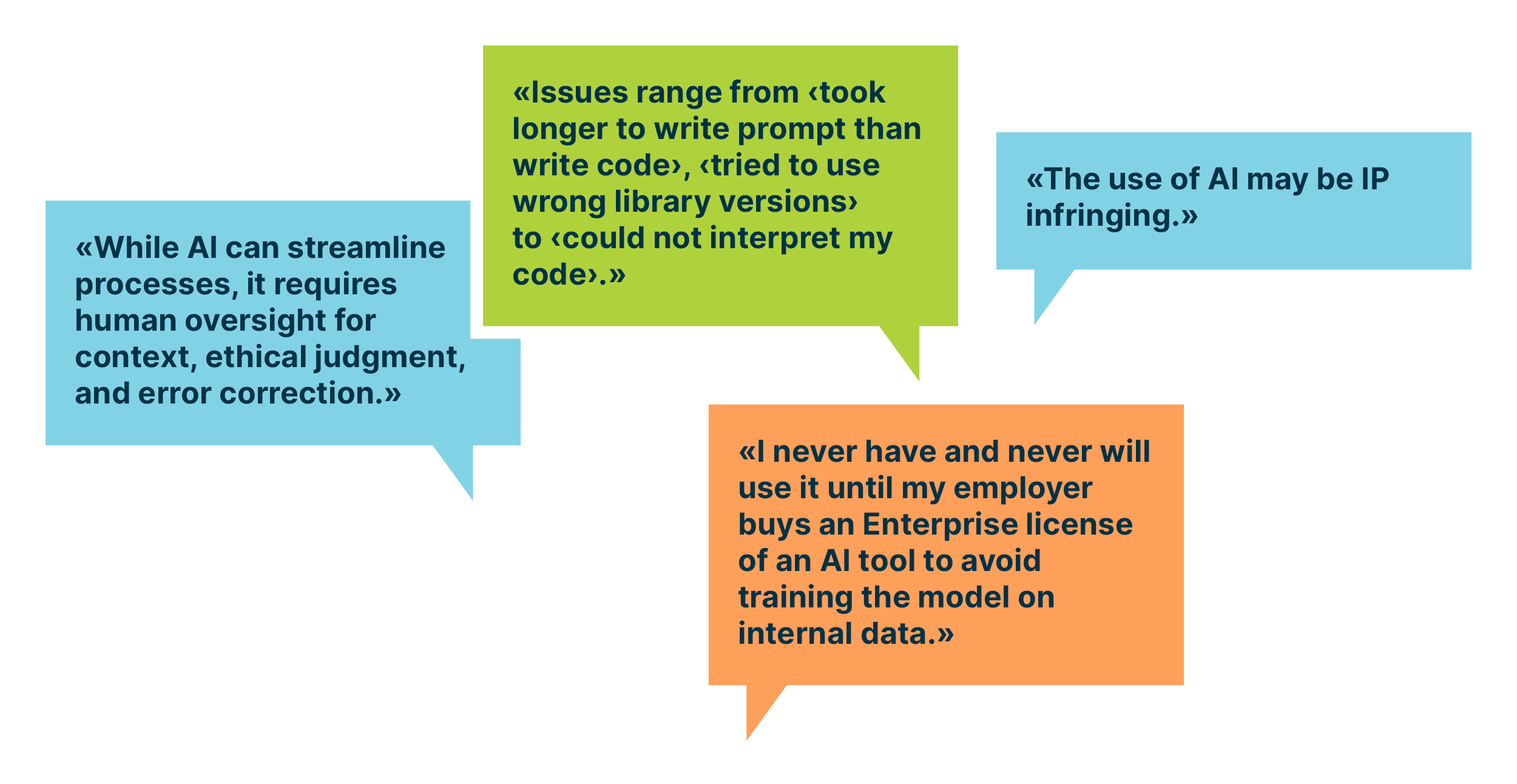
The future of software engineers in the AI era
Predictions for AI's role in software development in 2024 and beyond
It is obvious: Discussions on AI in software engineering are swinging and will continue to swing between excitement and concern.
In 2024 and beyond, the spectrum of AI capabilities is projected to expand exponentially, aiding the software development process even further. Future AI tools are expected to be customizable: They will a) work with enterprise systems, and b) make suggestions, while leaving the decision up to the user.
While AI systems show mastery in multiple steps of the development life cycle, they also display some weaknesses. For example:
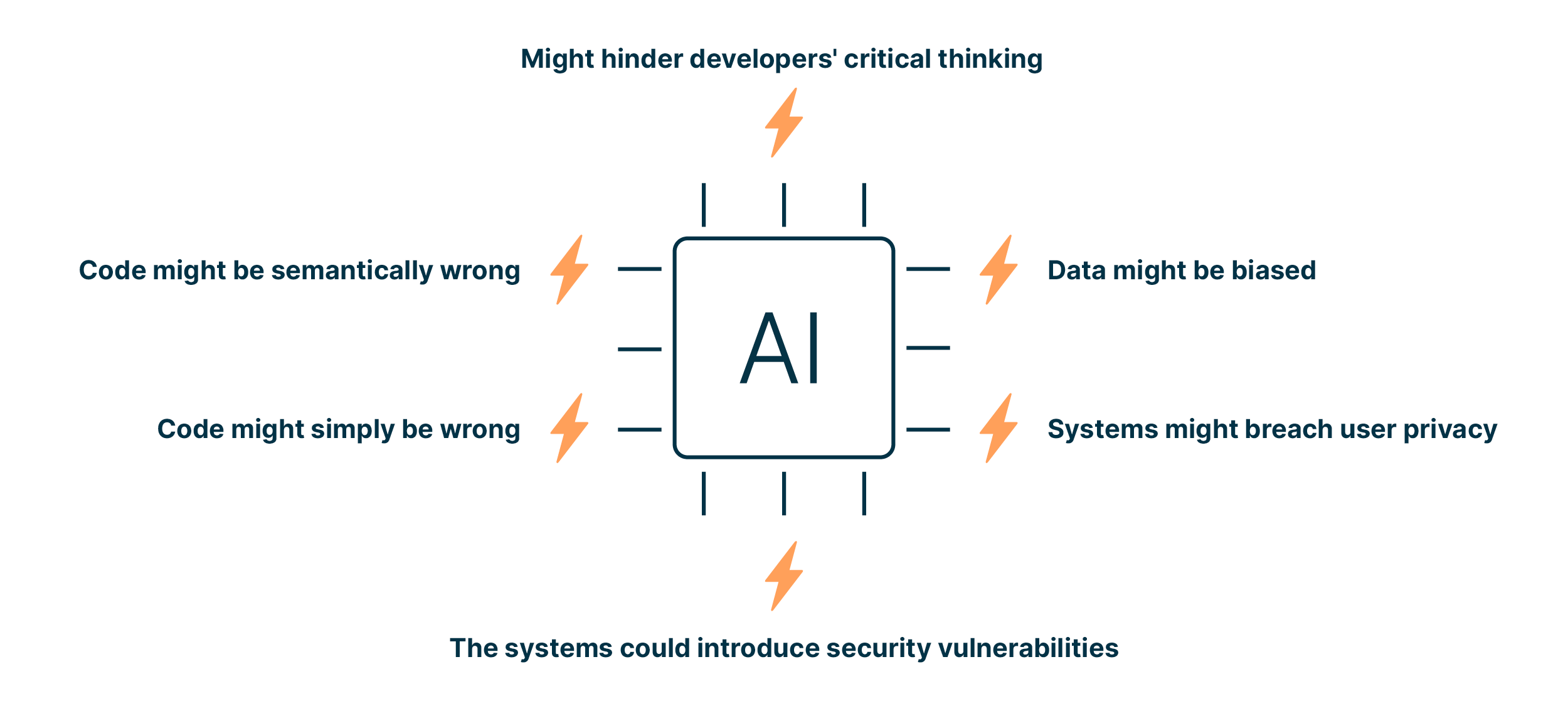
- Generated code might simply be wrong or not follow best practices
- Code might be syntactically correct (not broken), but semantically wrong
- Data might be biased, raising ethical questions
- If compromised, the systems could introduce security vulnerabilities
- Processing vast amounts of data, systems might inadvertently breach user privacy
- They also might hinder developers' critical thinking or problem-solving skills due to AI dependency
These concerns will linger on well past 2024. In other words: It would be premature for software engineers to twiddle their thumbs. Rather the opposite should be the case.
The evolving role of software engineers
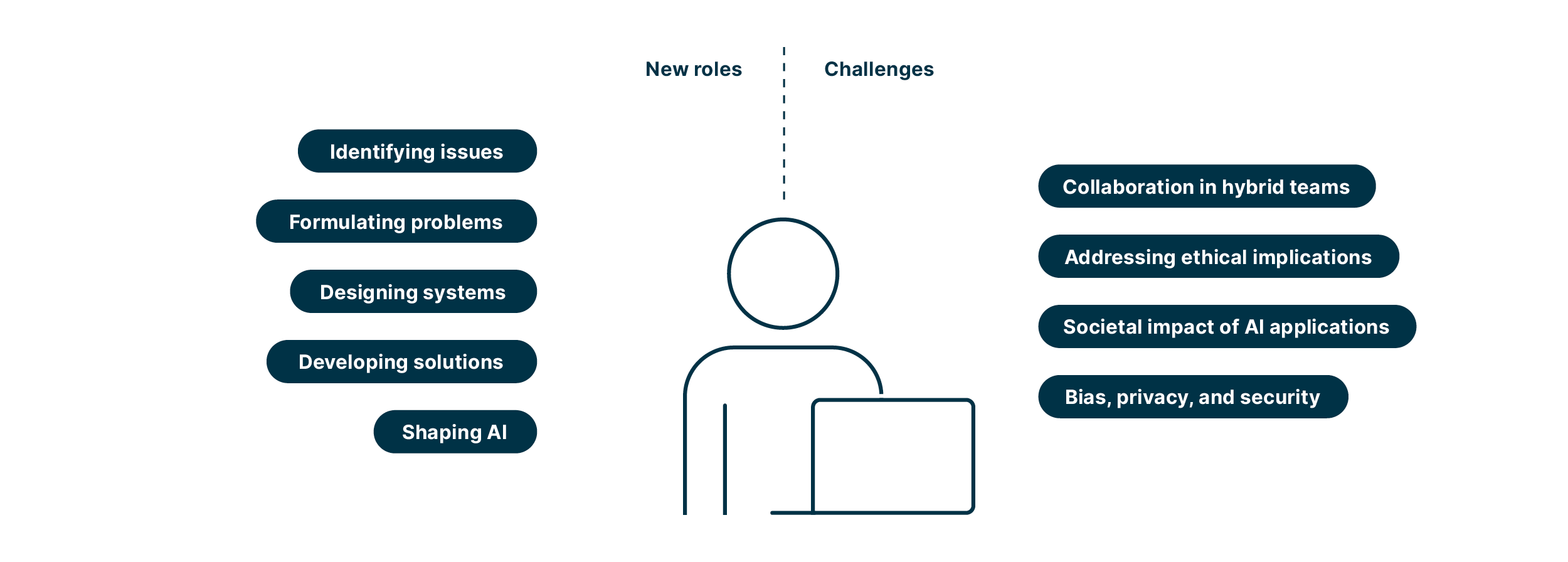
The key to survival for engineers will be to stay open to continuous learning, to collaborate with AI systems, and to specialize in AI fields. At the same time it is vital for them to expand their human skills, such as critical thinking, creativity, communication, and teamwork.
In their new roles, programmers will be gravitating towards the bigger picture: identifying issues, formulating problems, designing systems, developing solutions, and shaping AI to help achieve those solutions.
The challenges? Many! For example, collaboration in hybrid teams between software engineers, data scientists, and domain experts will become more common. Even more important: Engineers will play a vital role in considering and addressing the ethical implications of AI technologies. Plus, they will have to deal with responsibility regarding the societal impact of AI applications, including issues related to bias, privacy, and security.
How software engineers can leverage AI
Software engineers should not hesitate to take advantage of the new tools.
Let’s fantasize a little about the opportunities: Supported by AI, software engineers could create digital solutions where cognitive services become part of the architecture. For example, think of an employee evaluation tool with extended AI capabilities which reads the sentiment of the uploaded feedback docs and suggests goals or recommends courses.
Examples of how developers can integrate AI into their work
Here are two specific examples of how AI could support software engineers in their daily work:
- Use of patterns
A programmer has use patterns in how to implement a feature (widget, API, back end) when creating an application. AI can learn these patterns. So when a programmer adds a new feature, he only has to describe it (prompting) and the code, including the tests, are automatically generated by the AI. - Virtual pair-programming
Pair-programming is a method where one person does the programming while another assists with any task at hand. It has the potential to boost flow and work satisfaction for multiple reasons: a virtual companion is available 24/7, understands context and tasks, provides instant help and feedback, etc.
AI vs. human programmers: who wins?
Whether AI or human programmers win the coding competition depends on the specific tasks involved. Here are some considerations on «AI vs. human programmers»:
The strengths and weaknesses of AI programmers
AI tools are equipped to process massive datasets quickly and accurately. As programming often involves data analysis and repetitive task automation, this is where AI shines. With machine learning algorithms, AI can even learn and adapt over time, thereby optimizing software development.
Yet, when it comes to creative problem-solving or understanding complex user experiences, AI faces serious limitations. While it can be programmed to mimic many human attributes, its ability to truly understand and replicate human thinking remains questionable.
| Best practices for implementing AI governance |
||||||
| AI | Human | |||||
|
Strengths |
|
|
||||
|
Weaknesses |
|
|
||||
The strengths and weaknesses of human programmers
Unlike AI, human programmers have the ability to be genuinely creative, to think abstractly, and to factor in ethics when making decisions. These traits, along with the ability to understand human needs and experiences, allow human programmers to design software that is highly user-centric and innovative.
No surprise: humans have their share of weaknesses, too. Highly repetitive or monotonous tasks can lead to mistakes, inefficiencies, or even a lack of motivation over time. Additionally, humans can't match the pace and accuracy of AI when it comes to processing large datasets, which can slow down some aspects of software development.
So, who wins now?
Both of them. AI and human programmers both have unique strengths that make them invaluable in different scenarios within software development. Understanding this can help leverage their respective strengths, leading to a more effective and dynamic future for software development.
|
«Developers who work behind closed doors are passé. Today, those with strong soft skills such as emotional intelligence, strong communication skills, creativity, and flexibility are in demand, who dedicate themselves to complex tasks and leave routine tasks to AI.» Vanessa Aicher |
|
The truth about AI replacing software engineers is …
Despite the immense potential of AI, it stands to augment rather than replace software engineers by acting as a copilot. The unique human capabilities for creativity, problem-solving, and emotional intelligence remain irreplaceable.
The reality we're moving towards isn't an AI-run world, but a harmonious blend of AI and human talents. It's time we view AI as an aid that enhances productivity and not as a competitor that will make us obsolete. The opposite is true: AI will mitigate the shortage of skilled labor in the IT industry.
Embrace this changing landscape by upskilling in AI technologies and aligning yourself with AI’s potential to enhance your work and industry. Let the machines handle the repetitive tasks while you focus on strategic, creative efforts that make a difference.
How about you? Are you preparing to make AI your ally in today's digitalized and fast-paced world?
Remember, humans innovated technology. It is a tool, and a tool serves its master. Stay the master.






